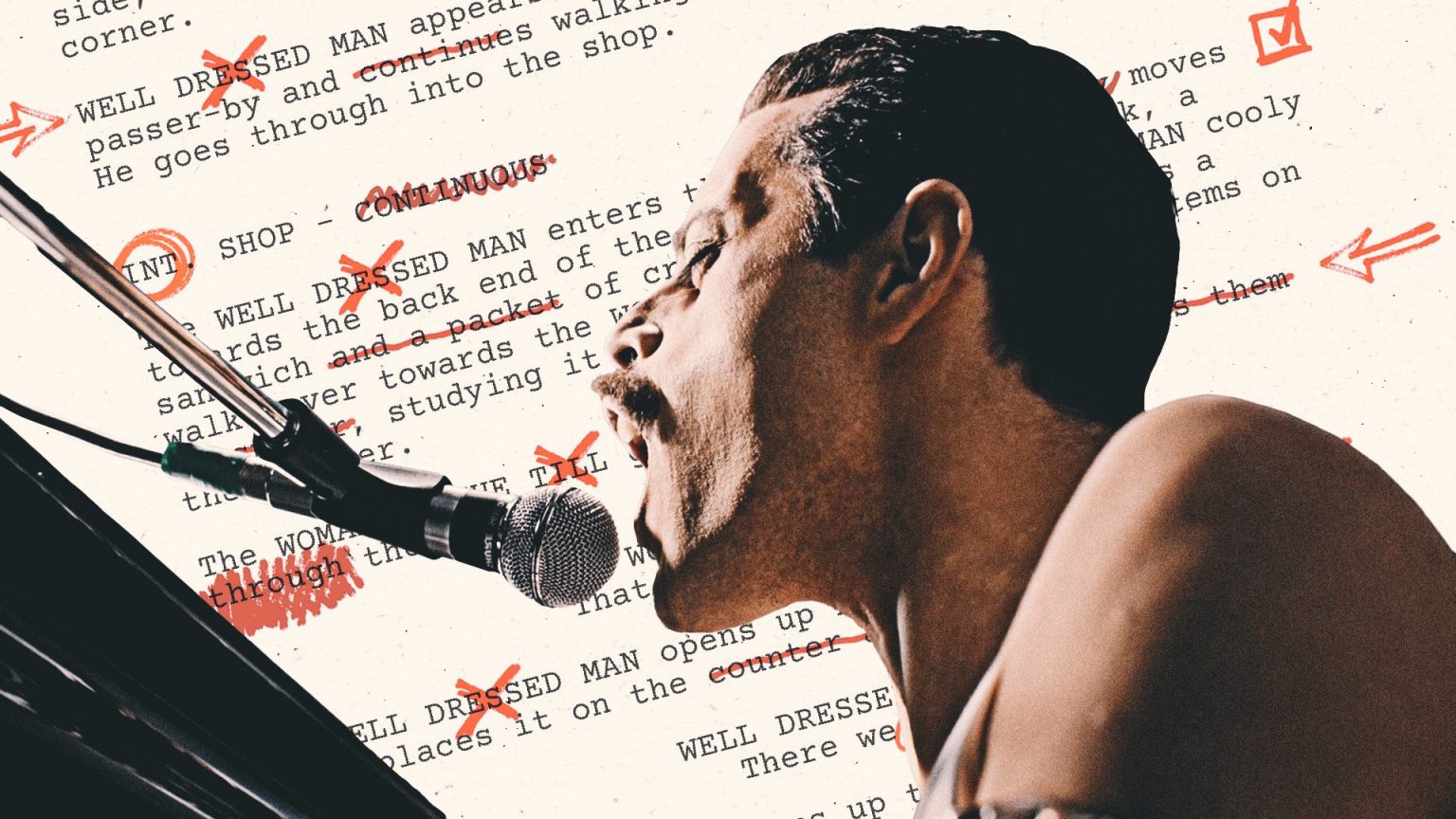Auteur theory, which suggests that a director is the main author of a film, receives plenty of fair criticism. For example, what would a Spielberg film be without a John Williams score to elevate it? Regardless, every film is certainly organized around a perspective. Whether it’s driven by a director, a writer, a producer, a studio, a property, a genre, or some combination, there is a central force towards which the hundreds or even thousands of people working on a film contribute.
It’s easy to hold an auteur up to unreasonable reverence. And it’s also easy to disregard the less visible people who help author a film even when it’s them we should be examining.
Around eight years ago, a Freddie Mercury biopic began development. The project cycled through stars Sacha Baron Cohen and Ben Whishaw before landing on Rami Malek. The script passed from writer to writer, resulting in all of Peter Morgan, Anthony McCarten, and Justin Haythe receiving some sort of script or story credit. And, by now, everyone is aware of how at one point David Fincher, Tom Hooper, and Dexter Fletcher were variously attached to direct, before Bryan Singer was finally tabbed, only to be fired mid-production in favor of Fletcher.
Such woes aren’t unheard of; three of the new Star Wars films have seen similar writer and director switch-ups. It’s the particulars of the firing and the context under which the project was developed that make Bohemian Rhapsody a different kind of film, and the perfect one to examine when it comes to considering the idea of authorship, particularly the ethics of authorship.
If a film about Queen was to be made, it would always require consent and consultation from the band members. But, actually, Bohemian Rhapsody was partially developed and produced by two of the surviving members and the band manager. Three of the subjects of the film were also three of the filmmakers, resulting in a tension that can be seen in the film’s development.
That tension is most exemplified by Sacha Baron Cohen’s involvement. Two years ago, Cohen appeared on The Howard Stern Show and talked about the creative differences that culminated in his departure. Initially, one of the band members pitched the film with Mercury dying halfway through and the second half focusing on the rest of the band. And while Cohen wanted to get into more adult-oriented content, the band wanted to keep it family friendly. Cohen even compared the development to hagiography, or biography that depicts its subjects with reverence.
While Bohemian Rhapsody is a film about Mercury, it’s also a film about the rest of the band, meaning that it is, in some respects, a partial autobiography — and those are never sole arbiters of any kind of history, nor should they be. Yet, a film, in particular, can hide that aspect, as general audiences don’t necessarily see who the producers are or know the extent of the producers’ involvement.
In terms of work behind the camera, it’s often the director who is first to be noticed, but the name that will appear in the credits for Bohemian Rhapsody, Bryan Singer, won’t tell the whole story and will present ethical questions about how we watch films.
Reports allege that Singer often showed up late to set and clashed with Malek, before not showing up at all due to, according to Singer, having to take care of an ill parent. He was fired with weeks left of shooting, leaving it to Dexter Fletcher to finish the remaining shooting schedule and to work on the edit.
Directors often don’t have final cut, especially on studio projects. And another figure supervising post-production is enough to question the authorship of a film, as the edit is where a film’s perspective comes into focus. But the fact that Fletcher directed only a few weeks of the production, and with reports that cinematographer Newton Thomas Sigel had to direct on days when Singer didn’t show, further confuses the idea of authorship.
Plenty of non-scholarly viewers have been thinking about authorship throughout film history. A Hitchcock film, a Kurosawa film, a Denis film, a Spike Lee film, a Nolan film — they’re all understood through the auteurs behind them.
But now more people are looking at films where there’s evident tension in authorship. While many who want Warner Bros. to release the “Snyder cut” of Justice League have arguably created more toxicity than discussion, they are speaking to the tension created by the film’s dual-authorship of Snyder and Joss Whedon, who was brought on for reshoots and post-production — as are those that point out the tension between Phil Lord and Chris Miller and Ron Howard in Solo: A Star Wars Story.
Bohemian Rhapsody is a sort of extreme, as tension in authorship would still be worthwhile to examine due to the band’s involvement, even if a single director had seen the film through its entire production. But the accusations against Singer as well as his firing add even more layers on top of that. While auteur theory is undoubtedly flawed, often burying areas of discussion beyond the director, the idea of authorship of some form allows us to dig deeper and create an important framework for considering film.




